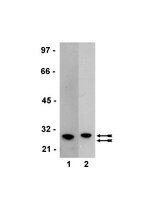FLCN, a novel autophagy component, interacts with GABARAP and is regulated by ULK1 phosphorylation.
Dunlop, EA; Seifan, S; Claessens, T; Behrends, C; Kamps, MA; Rozycka, E; Kemp, AJ; Nookala, RK; Blenis, J; Coull, BJ; Murray, JT; van Steensel, MA; Wilkinson, S; Tee, AR
Autophagy
10
1749-60
2014
Show Abstract
Birt-Hogg-Dubé (BHD) syndrome is a rare autosomal dominant condition caused by mutations in the FLCN gene and characterized by benign hair follicle tumors, pneumothorax, and renal cancer. Folliculin (FLCN), the protein product of the FLCN gene, is a poorly characterized tumor suppressor protein, currently linked to multiple cellular pathways. Autophagy maintains cellular homeostasis by removing damaged organelles and macromolecules. Although the autophagy kinase ULK1 drives autophagy, the underlying mechanisms are still being unraveled and few ULK1 substrates have been identified to date. Here, we identify that loss of FLCN moderately impairs basal autophagic flux, while re-expression of FLCN rescues autophagy. We reveal that the FLCN complex is regulated by ULK1 and elucidate 3 novel phosphorylation sites (Ser406, Ser537, and Ser542) within FLCN, which are induced by ULK1 overexpression. In addition, our findings demonstrate that FLCN interacts with a second integral component of the autophagy machinery, GABA(A) receptor-associated protein (GABARAP). The FLCN-GABARAP association is modulated by the presence of either folliculin-interacting protein (FNIP)-1 or FNIP2 and further regulated by ULK1. As observed by elevation of GABARAP, sequestome 1 (SQSTM1) and microtubule-associated protein 1 light chain 3 (MAP1LC3B) in chromophobe and clear cell tumors from a BHD patient, we found that autophagy is impaired in BHD-associated renal tumors. Consequently, this work reveals a novel facet of autophagy regulation by ULK1 and substantially contributes to our understanding of FLCN function by linking it directly to autophagy through GABARAP and ULK1. | 25126726
 |
Lactate flux in astrocytes is enhanced by a non-catalytic action of carbonic anhydrase II.
Stridh, MH; Alt, MD; Wittmann, S; Heidtmann, H; Aggarwal, M; Riederer, B; Seidler, U; Wennemuth, G; McKenna, R; Deitmer, JW; Becker, HM
The Journal of physiology
590
2333-51
2012
Show Abstract
Rapid exchange of metabolites between different cell types is crucial for energy homeostasis of the brain. Besides glucose, lactate is a major metabolite in the brain and is primarily produced in astrocytes. In the present study, we report that carbonic anhydrase 2 (CAII) enhances both influx and efflux of lactate in mouse cerebellar astrocytes. The augmentation of lactate transport is independent of the enzyme's catalytic activity, but requires direct binding of CAII to the C-terminal of the monocarboxylate transporter MCT1, one of the major lactate/proton cotransporters in astrocytes and most tissues. By employing its intramolecular proton shuttle, CAII, bound to MCT1, can act as a ‘proton collecting antenna' for the transporter, suppressing the formation of proton microdomains at the transporter-pore and thereby enhancing lactate flux. By this mechanism CAII could enhance transfer of lactate between astrocytes and neurons and thus provide the neurons with an increased supply of energy substrate. | 22451434
 |
Listeria monocytogenes impairs SUMOylation for efficient infection.
Ribet, D; Hamon, M; Gouin, E; Nahori, MA; Impens, F; Neyret-Kahn, H; Gevaert, K; Vandekerckhove, J; Dejean, A; Cossart, P
Nature
464
1192-5
2010
Show Abstract
During infection, pathogenic bacteria manipulate the host cell in various ways to allow their own replication, propagation and escape from host immune responses. Post-translational modifications are unique mechanisms that allow cells to rapidly, locally and specifically modify activity or interactions of key proteins. Some of these modifications, including phosphorylation and ubiquitylation, can be induced by pathogens. However, the effects of pathogenic bacteria on SUMOylation, an essential post-translational modification in eukaryotic cells, remain largely unknown. Here we show that infection with Listeria monocytogenes leads to a decrease in the levels of cellular SUMO-conjugated proteins. This event is triggered by the bacterial virulence factor listeriolysin O (LLO), which induces a proteasome-independent degradation of Ubc9, an essential enzyme of the SUMOylation machinery, and a proteasome-dependent degradation of some SUMOylated proteins. The effect of LLO on Ubc9 is dependent on the pore-forming capacity of the toxin and is shared by other bacterial pore-forming toxins like perfringolysin O (PFO) and pneumolysin (PLY). Ubc9 degradation was also observed in vivo in infected mice. Furthermore, we show that SUMO overexpression impairs bacterial infection. Together, our results reveal that Listeria, and probably other pathogens, dampen the host response by decreasing the SUMOylation level of proteins critical for infection. | 20414307
 |
Tuning microtubule-based transport through filamentous MAPs: the problem of dynein.
Michael Vershinin, Jing Xu, David S Razafsky, Stephen J King, Steven P Gross
Traffic (Copenhagen, Denmark)
9
882-92
2008
Show Abstract
We recently proposed that regulating the single-to-multiple motor transition was a likely strategy for regulating kinesin-based transport in vivo. In this study, we use an in vitro bead assay coupled with an optical trap to investigate how this proposed regulatory mechanism affects dynein-based transport. We show that tau's regulation of kinesin function can proceed without interfering with dynein-based transport. Surprisingly, at extremely high tau levels--where kinesin cannot bind microtubules (MTs)--dynein can still contact MTs. The difference between tau's effects on kinesin- and dynein-based motility suggests that tau can be used to tune relative amounts of plus-end and minus-end-directed transport. As in the case of kinesin, we find that the 3RS isoform of tau is a more potent inhibitor of dynein binding to MTs. We show that this isoform-specific effect is not because of steric interference of tau's projection domains but rather because of tau's interactions with the motor at the MT surface. Nonetheless, we do observe a modest steric interference effect of tau away from the MT and discuss the potential implications of this for molecular motor structure. | 18373727
 |











